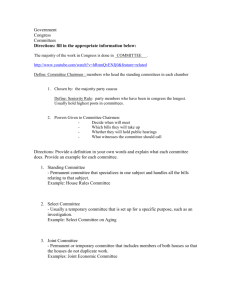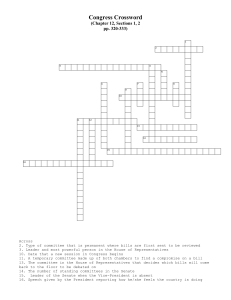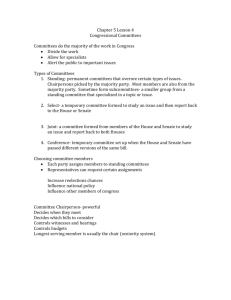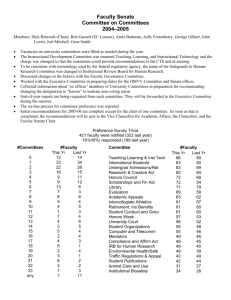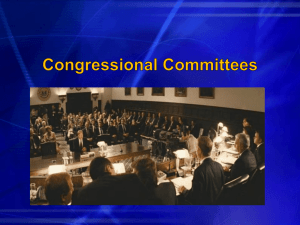Congress and Committees
advertisement
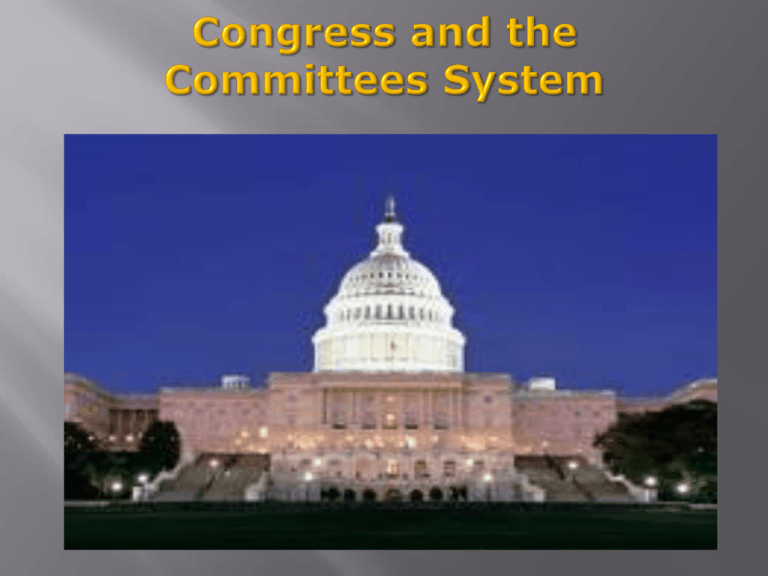
1) Allows for the division of labor so Congress can consider a vast number of bills each year. 110th Congress Bills= House: 7,336 & Senate: 3,741 2) Members develop specialization- gain expertise in specific areas (do not have to depend on professional staff and executive agencies for background information). 3) Subcommittees share specific tasks with the “parent” committee. Subcommittees are responsible to, and work within the guidelines established by, the parent committee. Senate: 21 committees, over 65 subcommittees House: 20 committees, over 100 subcommittees There are 4 joint committees between both houses of Congress Standing Committees: - permanent subject matter committees - have legislative jurisdiction - consider bills and issues - recommend measures for consideration. - oversight responsibility of agencies, programs, and activities within jurisdictions. - oldest standing committee = House Ways and Means Committee (1802) - - - Select (Special) Committees: formed for specific purpose; temporary conduct investigations, studies, and, consider measures. examine emerging issues that don’t fit within existing standing committee jurisdictions. handle some oversight or “housekeeping” responsibilities. Joint Committees: Permanent include members of House and Senate. Four joint committees: Economic, Library, Printing, Taxation. conduct studies or perform housekeeping tasks rather than consider measures. Conference Committees: - temporary include House and Senate negotiators created to resolve differences between versions of similar House and Senate bills. Members express preferences to a party selection committee. Members usually go to areas where they have experience or concern their districts. Committees dealing with appropriations, taxes, and finance are always sought after because they deal with allocation of money. Controlled by parties in particular the majority party. Chairperson for standing committees usually comes from majority party; seniority usually prevails. Most influential member of the committee. Arranges meetings, controls staffing and funding, sets agenda. Senate= Steering Committee makes assignments for both parties. House= Committee on Committees= Republicans; Steering and Policy Committee= Democrats Senate Committees Agriculture Appropriations Armed Services Budget Education and Labor Energy and Commerce Financial Services Foreign Affairs Homeland Security House Administration Intelligence (Permanent Select) Judiciary Natural Resources Oversight and Government Reform Rules Science and Technology Small Business Standards of Official Conduct Transportation and Infrastructure Veterans' Affairs Ways and Means (Whole) House Committees Aging (Special) Agriculture, Nutrition and Forestry Appropriations Armed Services Banking, Housing, and Urban Affairs Budget Commerce, Science and Transportation Energy and Natural Resources Ethics (Select) Environment and Public Works Finance Foreign Relations Health, Education, Labor, and Pensions Homeland Security and Governmental Affairs Indian Affairs Intelligence (Select) Judiciary Rules and Administration Small Business and Entrepreneurship Veterans' Affairs 1. Pigeonholed- when congressional committees that deal with new bills introduced in the United States congress decide to ignore a new bill, never make it out of committee 2. Marked up- refers to the process by which a U.S. congressional committee or state legislative session debates, amends, and rewrites proposed legislation. 3. Closed rule- “gag rule” strict limits on debates and forbids amendments from the floor, except those from committees, members have little choice but to vote for or against 4. Open rule- permits amendments and has less strict time limits, allowing input from other members 5. Committee chairmen- most important person shaping the agenda, chosen usually by seniority, voted by members of the house with a secret ballot 6. Caucuses with Congress- members of congress joins specific groups that share their same interests or points of view. More than 70 groups, their goal is to shape the agenda of Congress 7. Incumbency- The incumbent, in politics, is the holder of a political office. It is a person who already holds political office. 95% of incumbents win re-election Voters typically know incumbents well and have strong opinions about their performance. Challengers are less familiar and invariably fall short on straightforward comparisons of experience and (in the presidential arena) command of foreign policy.
